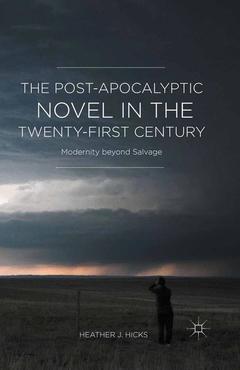Description
The Post-Apocalyptic Novel in the Twenty-First Century, 1st ed. 2016
Modernity beyond Salvage
Author: Hicks H.
Language: English
Publication date: 03-2016
208 p. · 14x21.6 cm · Paperback
Publication date: 01-2016
208 p. · 14x21.6 cm · Hardback
Description
/li>Contents
/li>Biography
/li>
Introduction: Beyond Salvage
1. The Mother of All Apocalypses in Margaret Atwood's Oryx and Crake
2. 'This Time Round': David Mitchell's Cloud Atlas and the Apocalyptic Problem of Historicism
3. Friday at the End of the World: Apocalyptic Change and the Legacy of Robinson Crusoe in Cormac McCarthy's The Road and Jeanette Winterson's The Stone Gods
4. 'Stop! Can You Hear the Eagle Roar?': Zombie Kitsch and the Apocalyptic Sublime in Colson Whitehead's Zone One
5. 'The Raw Materials': Petromodernity, Retromodernity and the Bildungsroman in Paolo Bacigalupi's Ship Breaker
Conclusion
Heather J. Hicks is Associate Professor of English at Villanova University, USA. She is author of The Culture of Soft Work: Labor, Gender and Race in Postmodern American Narrative and has published in several journals including Postmodern Culture, Arizona Quarterly, Camera Obscura, and Contemporary Literature.




